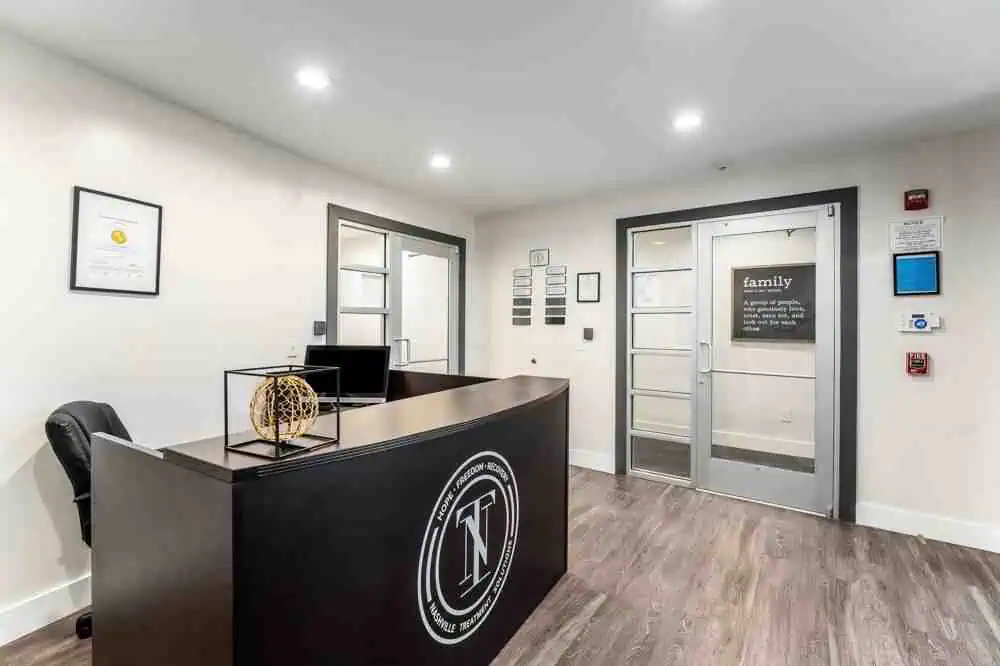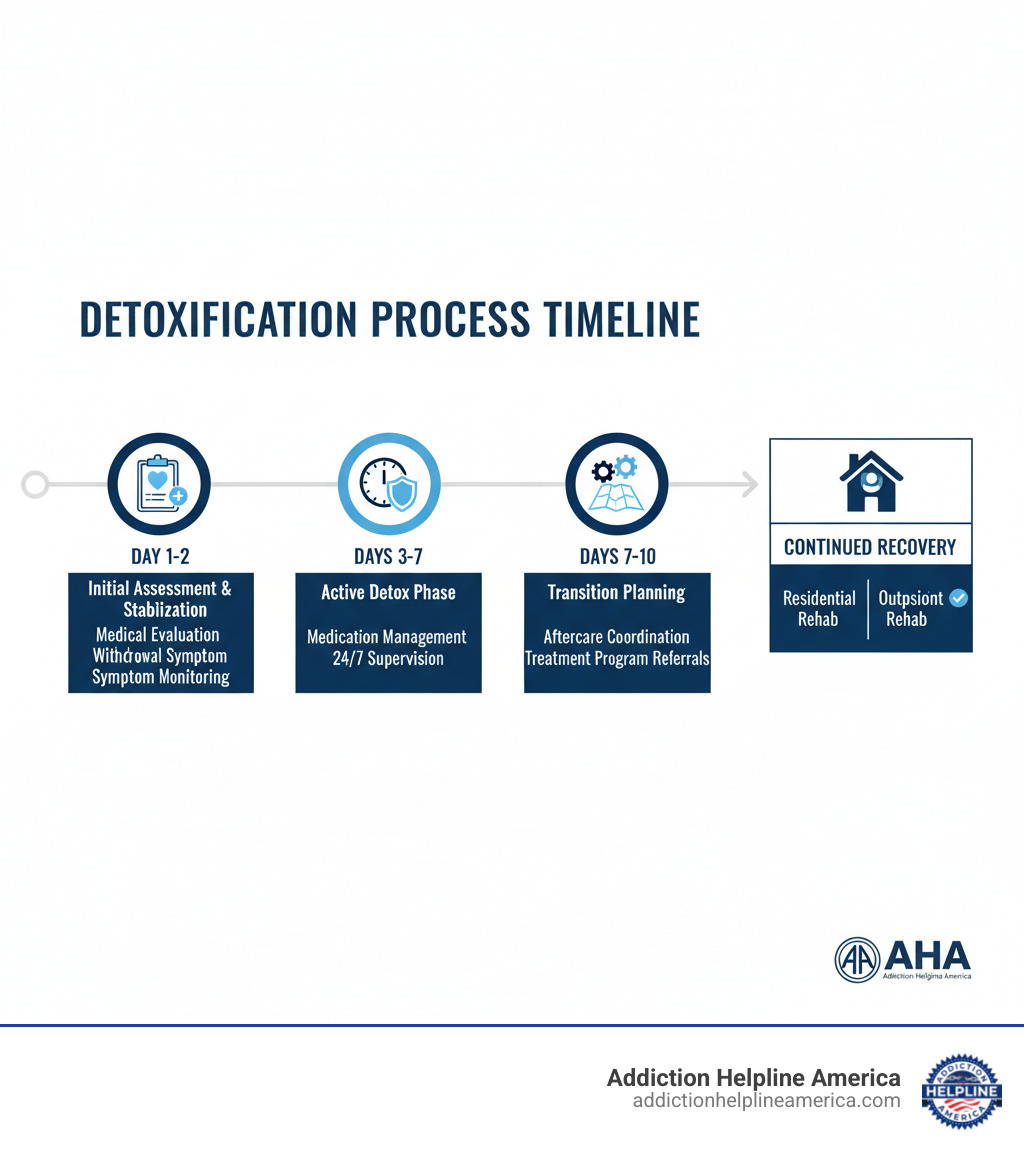
The First Step to a New Beginning
Searching for detox programs near me is the first step toward recovery from a substance use disorder. These specialized facilities provide medically supervised withdrawal management, creating a safe foundation for healing. Finding the right program can feel overwhelming, but there are many resources available.
Quick Ways to Find Detox Programs:
- Call your family doctor for professional referrals and health assessments.
- Contact government helplines for free, state-specific resources.
- Search online directories that filter by location, insurance, and substance.
- Reach addiction hotlines for 24/7 confidential guidance.
- Connect with community mental health organizations for local support.
Detoxification is the process of safely managing withdrawal symptoms under professional supervision. It is not a complete cure for addiction, but it prepares your body and mind for the next phase of treatment. In a supervised setting, medical professionals monitor your health, manage discomfort, and prevent emergencies that can occur when stopping certain substances abruptly.
At Addiction Helpline America, our 24/7 confidential helpline connects individuals and families with vetted local detox programs. Our experienced specialists understand the challenges you face and can help you find resources that match your specific needs.

Basic detox programs near me vocab:
Understanding What a Detox Program Is (and Isn’t)
When searching for detox programs near me, it’s crucial to understand their role. Detox is the essential first step, but it’s not the entire recovery journey. Think of it as the medical process of safely removing substances from your body while managing withdrawal symptoms. A structured program provides a safe, medically supervised environment that you can’t replicate at home.
This is critical because withdrawing from substances like alcohol and benzodiazepines can be dangerous without medical help. A quality detox program will:
- Keep you safe: Medical staff monitor your vital signs and intervene if complications arise.
- Manage discomfort: Medications can ease severe withdrawal symptoms, making the process more bearable.
- Reduce relapse risk: A supervised, substance-free environment protects you during your most vulnerable time.
- Prepare you for what’s next: Once stable, you can engage in the therapy needed for lasting recovery.
However, detox alone won’t keep you sober. Addiction is a complex condition affecting your mind, behaviors, and relationships. While detox addresses physical dependence, it doesn’t resolve the underlying reasons for substance use. Without follow-up treatment like therapy and support groups, the risk of relapse is high. Detox prepares you for rehab; it isn’t rehab itself.

Why Detox is a Necessary First Step
When you regularly use substances, your body adapts and comes to depend on them. Removing them triggers withdrawal, which can range from unpleasant to life-threatening. This is why professional detox is critical for safety.
- Alcohol withdrawal can cause tremors, anxiety, and nausea, but in severe cases, it can lead to seizures and a fatal condition called delirium tremens (DTs) without medical care. Our Alcohol Withdrawal Timeline explains what to expect.
- Opioid withdrawal is miserable, with muscle aches, vomiting, and overwhelming cravings that make it nearly impossible to endure alone.
- Benzodiazepine withdrawal (from drugs like Xanax or Klonopin) can trigger seizures, panic attacks, and psychosis. Abruptly stopping is dangerous and requires medical supervision.
Professional detox prevents these medical emergencies. Trained staff anticipate and manage complications, changing a potentially deadly experience into a manageable medical process.
Call Now – Your Journey to Recovery Begins Today!

Take the first step towards a healthier life! Call now to connect with our compassionate team and start your recovery journey today. Your path to healing awaits!
Our recovery specialists are available 24/7 to provide support, and all calls are confidential and free. Reach out anytime – we’re here to help!
Medical Detox vs. Clinical Detox Programs
Not all detox programs near me are the same. Understanding the difference between medical and clinical detox helps you find the right fit.
Medical detox is the most intensive option, often in a hospital-like setting with 24/7 monitoring by doctors and nurses. It uses Medication-Assisted Treatment (MAT) to manage symptoms and prevent complications. This includes FDA-approved medications to ease opioid cravings or prevent alcohol withdrawal seizures. Staff are experts at tapering off drugs—gradually reducing dosage to minimize discomfort. This is the safest choice for physical dependence on alcohol, opioids, or benzodiazepines.
Clinical detox programs are typically part of residential treatment centers and offer a supportive environment with less intensive medical supervision. Nurses may be on staff, but doctors are not always available 24/7. These programs focus on comfort measures and nutritional support with limited or no withdrawal medications. They are suitable for less severe withdrawal (e.g., from cannabis or stimulants) or as a step-down after medical stabilization.
At Addiction Helpline America, we can help you determine the appropriate level of care for your situation. You don’t have to make these decisions alone.
5 Surprising Ways to Find Detox Programs Near Me

Finding local detox programs near me can feel difficult, especially under stress. However, several effective avenues can lead you to the right support.
1. Consult Your Family Doctor or Nurse Practitioner
Your primary care provider is an excellent first point of contact. They know your medical history and can perform an initial health evaluation to assess the severity of your substance dependence. Based on this assessment, they can provide professional referrals to reputable local detox centers and addiction specialists, ensuring a smooth transition into care.
2. Use State Health Services and Helplines
Most states have government-funded health services and helplines designed to connect residents with addiction and mental health support. Your state’s department of health or mental health services website is a great place to start. These portals often provide directories, information on available services, and helplines that can guide you to free or low-cost treatment options in your community.
3. Explore Community Mental Health Organizations
Local non-profit and community mental health organizations are pillars of support. They offer information and referrals for detox programs near me, sometimes with direct access to free or sliding-scale services for those facing financial barriers. These organizations are deeply connected to the community and can provide a compassionate, personalized approach to finding help, often emphasizing the importance of Support Groups for Addiction as part of a holistic recovery plan.
4. Use Specialized Online Directories and Resources
Online directories are powerful tools for finding detox programs near me. These platforms allow you to filter search results by specific criteria, such as:
- Location: Pinpoint facilities in your area.
- Substance type: Find programs specializing in alcohol, opioids, etc.
- Program type: Differentiate between inpatient, outpatient, or medical detox.
- Insurance: See which centers accept your health plan.
Resources like our Addiction Help Online Ultimate Guide can help you steer your options. Always verify the information directly with the facility.
5. Contact a Confidential Addiction Hotline
For immediate, direct guidance, a confidential addiction hotline is one of the most effective resources. Hotlines like ours at Addiction Helpline America offer 24/7 support from trained specialists. The key benefits include:
- Immediate Guidance: Get crisis intervention and understand your options right away.
- Confidentiality: Discuss your situation openly without judgment.
- Personalized Recommendations: Receive custom referrals based on your unique needs.
- Direct Connections: Hotlines can facilitate referrals to vetted treatment centers.
Our Crisis Addiction Hotline is staffed by professionals ready to provide compassionate support and practical information to help you find the right detox programs near me.
What to Look For in a Quality Detox Center
Once you’ve found potential detox programs near me, you need to ensure they are safe and professional. Choosing the right facility is critical for a successful withdrawal.
Key quality indicators include:
- Accreditation: Look for accreditation from The Joint Commission (JCAHO) or the Commission on Accreditation of Rehabilitation Facilities (CARF). This signifies the center meets strict national standards for safety and care.
- Staff Credentials: Ensure licensed medical professionals—doctors, nurses, and certified addiction specialists—are managing your care. Ask about qualifications and staff-to-patient ratios.
- 24/7 Medical Supervision: Withdrawal can be unpredictable. A quality center provides round-the-clock medical supervision, with personnel physically present to respond to emergencies.
- Supportive Environment: The facility should be clean, safe, and as comfortable as possible to reduce anxiety and help you focus on healing.
- Aftercare Planning: Detox is just the first step. A good program will help plan your transition into residential treatment, outpatient programs, or support groups from day one.
- Dual Diagnosis Care: If you struggle with both addiction and a mental health condition (a co-occurring disorder), you need a program that can treat both simultaneously. Our guide on Dual Diagnosis Rehabs explains why this integrated approach is vital.

Understanding the Costs of Detox Programs Near Me
The cost of detox varies, but options are available for every budget. Don’t let fear of cost prevent you from seeking help.
- Government-Funded Programs: Many states offer free or low-cost detox services to eligible residents, though waitlists can sometimes be a factor.
- Private Treatment Centers: These generally cost more but often offer quicker admission and more amenities. Many provide payment plans or financing.
- Insurance Coverage: Most health insurance plans now cover at least a portion of detox costs. Call your provider to understand your specific benefits, deductible, and co-pay.
- Free Community Services: Non-profits and community health centers may offer services on a sliding scale or at no cost for those with limited income.
Call Now – Your Journey to Recovery Begins Today!

Take the first step towards a healthier life! Call now to connect with our compassionate team and start your recovery journey today. Your path to healing awaits!
Our recovery specialists are available 24/7 to provide support, and all calls are confidential and free. Reach out anytime – we’re here to help!
What Happens After Completing Detox?
Finishing detox is a major achievement, but it’s not the end of the journey. The transition to further treatment is critical for long-term sobriety, as addiction involves deep-seated psychological and behavioral patterns.
- Residential Treatment (Rehab): This provides an immersive, structured environment (typically 30-90 days) focused on therapy and building coping skills.
- Outpatient Programs (IOP/PHP): These allow you to live at home while attending scheduled treatment sessions, offering flexibility for those with strong home support.
- Aftercare and Support: Lasting recovery involves ongoing management. This includes therapy, support groups like AA/NA, and relapse prevention planning. Our article on What is Rehab Aftercare? explores these essential components.
Addiction is a chronic condition that requires ongoing care, but with the right support, lasting recovery is entirely possible.
Frequently Asked Questions about Detox Programs
As you search for detox programs near me, it’s normal to have questions. Here are answers to some of the most common ones.
How long does a typical detox program last?
The average detox program lasts between 3 and 10 days. However, the exact duration varies based on several factors: the type of substance used, the severity and length of the addiction, and your individual health. A medical assessment upon admission will help determine a timeline that is safe and effective for you. The priority is always safety, not speed.
Are there alternative options to traditional inpatient detox?
Yes, though traditional inpatient medical detox is the safest option for severe dependence (especially with alcohol or benzodiazepines). Alternatives may be appropriate for those with milder withdrawal symptoms and a strong, stable home environment.
- Outpatient detox involves living at home while attending daily appointments for medical supervision and medication.
- Holistic therapies like acupuncture, yoga, and nutritional support can complement medical care to improve comfort and well-being.
- Virtual support groups provide crucial community and accountability. Our Addiction Help Online Ultimate Guide explores many of these resources.
Always consult a medical professional to determine if an alternative to inpatient detox is a safe choice for your situation.
Can I get help if I have a mental health condition too?
Yes, and it is essential that you do. The combination of a substance use disorder and a mental health condition (like depression, anxiety, or PTSD) is called a “dual diagnosis” or co-occurring disorder. Effective treatment must address both conditions simultaneously.
Look for programs that offer integrated treatment, where a coordinated team of specialists treats your addiction and mental health needs together. When researching programs, ask specifically about their dual diagnosis care to ensure you receive comprehensive support. Our Mental Health Hotline Complete Guide further explains the importance of addressing mental health in recovery. You deserve treatment that addresses all of you.
Call Now – Your Journey to Recovery Begins Today!

Take the first step towards a healthier life! Call now to connect with our compassionate team and start your recovery journey today. Your path to healing awaits!
Our recovery specialists are available 24/7 to provide support, and all calls are confidential and free. Reach out anytime – we’re here to help!
Your Path to Recovery Starts Today
Searching for detox programs near me is a courageous first step. We know it can feel overwhelming, but you don’t have to have it all figured out to begin. Recovery is a journey, and it starts right now.
At Addiction Helpline America, we provide free, confidential, and personalized guidance to connect you with the right help. Our experienced specialists listen to your unique story and match you with vetted treatment centers from our nationwide network. Whether you’re in California, Florida, Texas, or New York, we can find a program that fits your needs, including specialized care like alcohol and drug addiction treatment programs in New Orleans, Louisiana.
There is hope for the future. Recovery is possible, and you don’t have to do it alone. Addiction thrives in isolation, but recovery flourishes in connection.
Our helpline is available 24/7 because the moment you need help can come at any time. When you call, you’ll find no judgment, only compassionate support and practical guidance. Don’t let fear hold you back. Your new beginning is waiting. Reach out today, and let us help you take that first step.
Our helpline is 100%
free & confidential
If you or someone you care about is struggling with drug or alcohol addiction, we can help you explore your recovery options. Don’t face this challenge alone—seek support from us.
Programs
Resources
Will my insurance
cover addiction
treatment?
We're ready to help
Find the best
drug or alcohol treatment
center
Are you or a loved one struggling with addiction? Call today to speak to a treatment expert.















